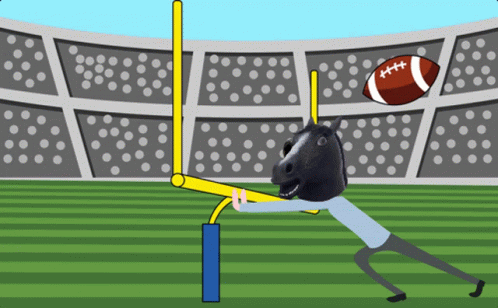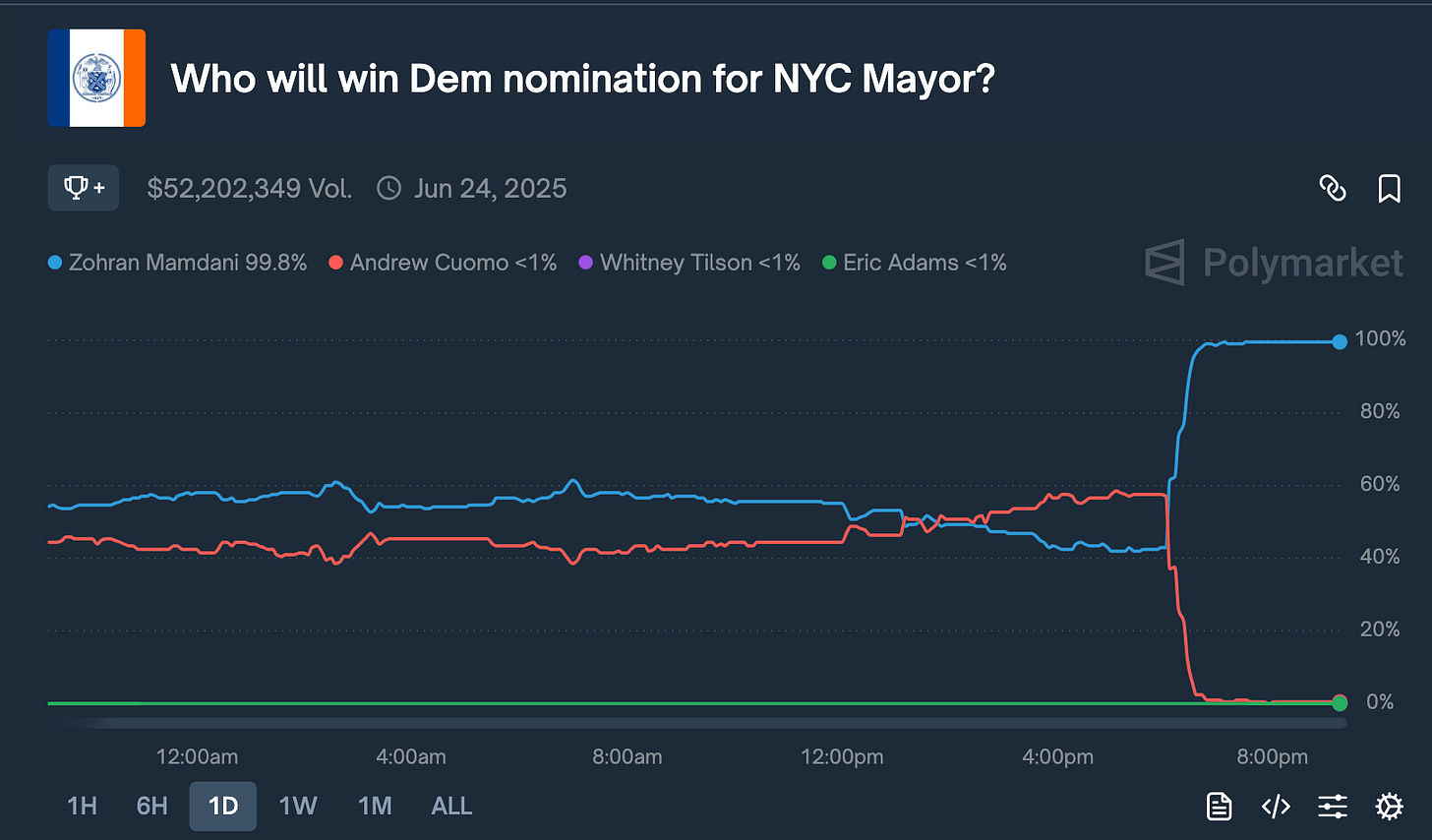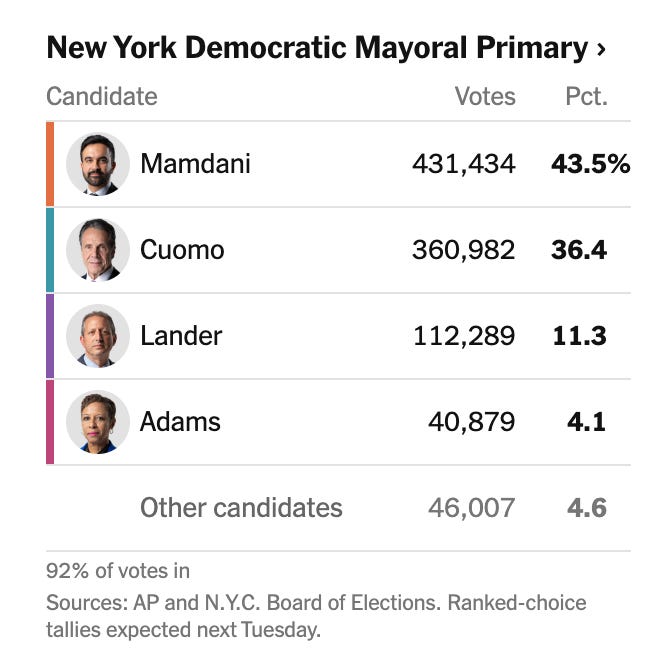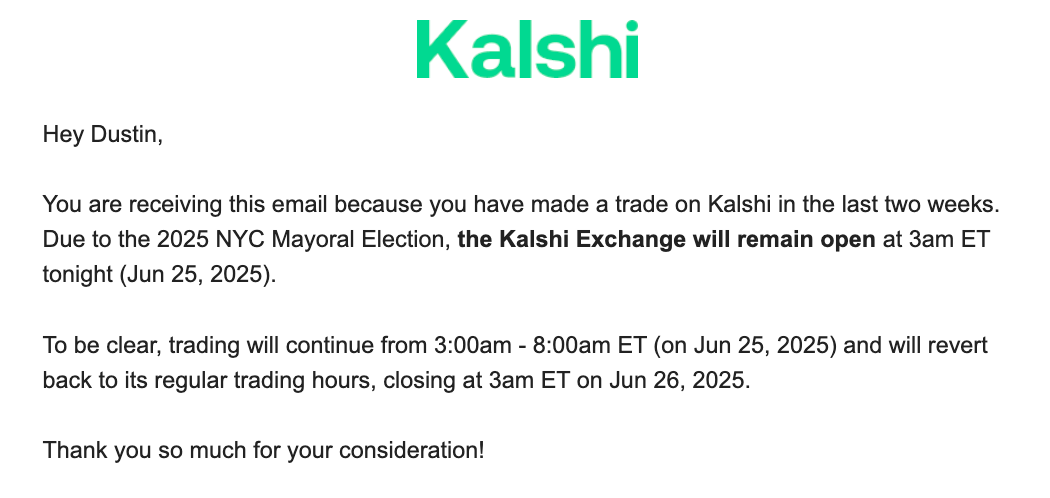Kalshi Moved The Goalposts From 'More Accurate Than Polls' To 'Called It First' In NYC Mayor Race
Prediction markets didn't predict that Zohran Mamdani would win the high-profile Democratic primary, as Andrew Cuomo was the favorite as polls closed.
Kalshi and Polymarket failed to predict the winner of a high-profile election, despite marketing themselves as more accurate than polls since last November.
In fact, a traditional poll ended up being more accurate than either prediction market.
Zohran Mamdani won the Democratic primary in the race for New York mayor on Tuesday, a stunning result to many observers as Andrew Cuomo had long been considered the favorite.
That was also true at both Kalshi and Polymarket, where Cuomo had been the favorite all spring. Everything changed on Monday, when an Emerson College poll dropped, showing a tight race and giving Mamdani the edge in the ranked choice primary. The poll almost instantly shifted prediction market odds in Mamdani’s favor, but over the next day and a half, the favorite flipped back and forth several times.
By the time polls closed in NYC, Cuomo was a small favorite at both Kalshi and Polymarket, trading at a 57% chance to win. Here are the odds for the past week and the past day at Kalshi, and then Polymarket:
As results began to come in, the odds quickly flipped to Mamdani. In the end, the race ended up being not very close. From the New York Times:
Prediction markets failed to indicate the eventual winner ahead of time:
Cuomo was the favorite for months, until Monday.
Prediction markets only moved toward Mamdani because of the Emerson College poll.
The movement back and forth between Mamdani and Cuomo would lead us to believe the final margin would be close, when it was not.
Prediction markets settled on Cuomo before actual results started being released.
That’s despite Kalshi and Polymarket beating us over the head with the idea that they are better than polls for the past eight months. But in their first high-profile test in a US election since November, they weren’t better than polls — or even correct.
Here’s Kalshi CEO Tarek Mansour in November:
“Let's be very clear, Kalshi called the election before anyone else. And it wasn't just last night. Polls were overwhelmingly inaccurate while prediction markets were spot on. Markets > biased polls”
And:
“On Truth: The need for truth and accurate data is crucial in today's world. Polls are failing us. Media is misleading us. Americans don't know where to turn to for truth. Yesterday's results reminded us of how broken current forecasts are. Election markets would solve this.”
And here’s Polymarket CEO Shayne Coplan:
“Trust the markets, not the polls.”
Maybe this is an outlier, and prediction markets will perform better in future opportunities. But when you declare as a blanket statement on numerous occasions that markets are better than polls, you can’t get too many of these wrong. At some point, everyone realizes you’re just offering probabilities instead of an early look at the future.
Also, while Kalshi and Polymarket said they “called” the election, the markets remained open; if you wanted to buy contracts on any candidate late Tuesday, you could. Here you can see the market at Kalshi is not closed as of 1 am Eastern:
Mansour took a victory lap for “calling” it first — after polls had closed — instead of taking the “L” for Kalshi’s failure to predict the winner ahead of time:
Finally, a few points of order on the “calling” of the election:
Most people following the election closely seemed to believe it was over within an hour of polls closing at 9 pm Eastern.
A pollster I follow, Adam Carlson, called it at 9:41 pm. Kalshi called it at 9:43 as did Polymarket.
There is probably some value in prediction markets calling elections quickly when traditional media outlets won’t, but again, the writing was on the wall. Cuomo conceded before 10:30 pm. Kalshi didn’t beat anyone by “hours,” let alone a single hour.
It’s also interesting to note that Kalshi originally emailed users that they would stay open past their normal closing time of 3 am, before backtracking. Kalshi clearly thought the election would be close and might be traded into the wee hours of the morning:
For the record: In non-US elections earlier this year, Kalshi was able to predict one right and one wrong. And if we count the Pope as an election, it didn’t get that right either.














